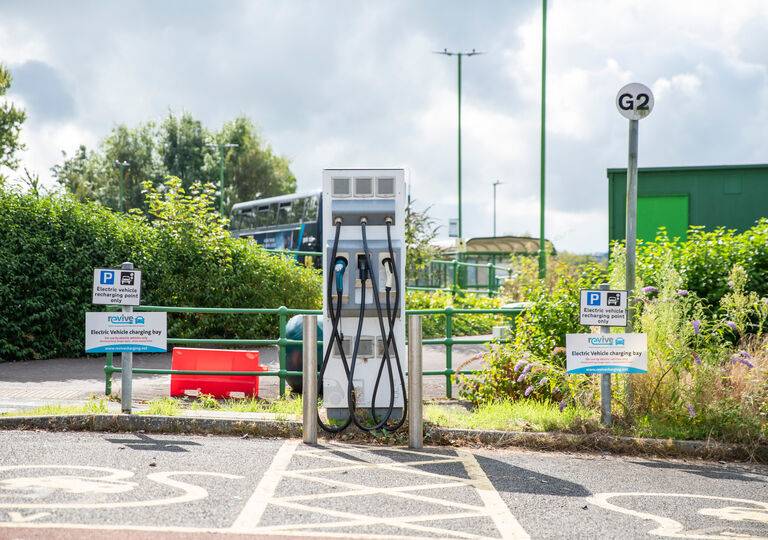Career Pathways in Sustainable Transport
Guidance on the variety of opportunities in the Low-Carbon Transport sector.

Welcome to your comprehensive guide on career pathways into the growing field of low-carbon transport. Whether you’re a novice looking to start a new career or a seasoned professional aiming to upskill, this guide offers a clear roadmap to a rewarding career in creating greener, more sustainable transport systems.
What is the Sustainable Transport Sector?
The transport industry is a major contributor to greenhouse gas emissions, prompting a surge in new jobs focused on reducing its environmental impact by shifting away from fossil fuels like diesel and petrol. The sector is now embracing more sustainable alternatives, leading to the development of roles that support this transition.
A key area of growth is in the design and implementation of new technologies. This includes engineering positions dedicated to creating renewable energy solutions for vehicles, as well as opportunities for existing workers to upskill. For instance, mechanics are now learning how to service electric vehicles, while electricians are training to install EV charging stations.
Beyond vehicles, jobs are emerging in support of active travel solutions like cycling and walking, which—together with infrastructure improvements—help reshape urban mobility in more sustainable ways. This includes roles focused on designing and promoting better walking and cycling routes that encourage greener transportation options.
The overarching goal is to enable people to travel more efficiently and sustainably, whether in private or public transport. The transition also ensures that transport remains reliable, well-connected, cost-effective, and accessible to communities. Additionally, this shift requires a range of skills in areas such as data analysis, urban planning, and project management, which are critical to managing the complexities of the transformation in the transport sector.
Transport accounts for 44% of emissions in the West of England, with only a 5% reduction since 2005—making it one of the biggest contributors to greenhouse gases and carbon dioxide emissions. To tackle this urgent environmental challenge, a massive shift towards more sustainable travel is essential, and with it, a growing demand for skilled workers in the transport sector. This presents a significant opportunity for those looking to make a real difference in the fight against climate change.
One of the most critical areas for growth is the installation of electric vehicle (EV) chargepoints. With only 6% of technicians in the South West currently trained to deliver this vital service, the region—and the nation—faces a potential shortfall of 16,000 technicians by 2035. This shortage threatens to slow down the adoption of electric vehicles, a key solution to reducing transport emissions.
This urgent need for trained technicians and specialists highlights a clear career opportunity. Whether you're an aspiring electrician, mechanic, or someone interested in cutting-edge sustainable technologies, the transport sector offers a rewarding pathway where you can help drive the transition to cleaner, greener travel.

Why get into the Sustainable Transport Sector?
You would be directly helping to improve air quality by encouraging a move towards more sustainable travel options and electric vehicles, resulting in less carbon emissions and healthier living. The UK government estimate that human-made air pollution is associated with up to 36,000 deaths a year.
By working in sustainable transport, you’ll be part of an industry at the forefront of technological advancements, from electric vehicles and renewable energy to smart city planning. You’ll contribute to the creation of cutting-edge solutions that help reduce our carbon footprint.
You would be promoting good health through active travel and physical activity, which could help the NHS save up to £17 billion within 20 years.
You would be helping to ensure public transport serves local communities, making it more accessible, reliable and better-connected.
By helping make sustainable transport more affordable and available to everyone, especially in areas that need it most, you’ll contribute to making transport fairer and more accessible for all people.
How to find the right course for you
If you are looking to start afresh in the transport sector, work experience, apprenticeships and technical education are all good routes to exploring new careers.
Option 1: University and Degree Apprenticeships
- Eligibility: 18+
Cost: Loans available to cover study. In case of degree apprenticeships, learners are paid (rates of pay vary)
Length: Varies depending on level and subject area but typically 3-5 years.
Benefits: Gain an in-depth knowledge and understanding of issues in this sector and network with professionals.
You can explore the variety of courses available on UCAS.
Option 2: Apprenticeships and Technical Education:
- Eligibility: 16+
Cost: Free. In case of apprenticeships, learners are paid (rates of pay vary)
Length: Varies depending on level and subject area but typically 1-5 years.
Benefits: Combines real work with training and study, where you get to put skills into practice.
You can explore the variety of courses, apprenticeships and technical education on the IfATE Occupational Maps. For local support and guidance, contact the Western Training Provider Network.
Option 3: Work Experience:
Experience is key to working in transport roles. Arranging a work experience placement is a great way to get a sense of the industry as well as build skills, gain experience and grow your network.
Professional organisations supporting different industries often provide advice on gaining work experience (look for links to ‘Professional and Industry Bodies’ at the bottom of this page)
If you have experience in a relevant role such as a Engineer or a Electrician and want to widen your skillset to include opportunities in transport, there are lots of short courses available to you. Below are some examples of common types of training.
Option 1: Skills Bootcamps
- Eligibility: 19 years+
- Cost: Free
- Length: up to 16 weeks (part-time/flexible courses to help fit around commitments)
- Benefits: Great for upskilling and/or broadening your skillset to support progressing your work opportunities, often a fast-track to an interview.
Search for a relevant bootcamp, or read the stories of others who have completed them.
Option 2: Further Training or Continual Professional Development (CPD)
- Eligibility: Various
- Cost: Various
- Length: As little as a few hours, up to weeks or months depending on the subject.
- Benefits: Great for keeping up-to-date on industry standards and developments, and developing new skills.
You can also contact our Skills Connect Advisors who are happy to talk through the different options available to you
Specialist areas in Sustainable Transport
Automotive Engineers work on the design, testing and building of different vehicles. To find out more including different ways to build towards this career pathway, visit dedicated pages on the National Careers Service website.
To find out which training providers in the region are offering local training opportunities in Sustainable Transport, head to the Skills Connect Directory.
Mechanics are now being skilled to work on different electric vehicles. For new entrants to the industry, there are different ways to such as starting as a technician.
To find out which training providers in the region are offering local training opportunities in Sustainable Transport, head to the Skills Connect Directory.
Electricians are now being skilled to install electric vehicles charging points in both domestic and commercial settings. For more information, head over to our pages dedicated to Pathways for Electricians which includes how to enter the industry as well as opportunities for qualified electricians to upskill in new renewable technologies.
To find out which training providers in the region are offering local training opportunities in Sustainable Transport, head to the Skills Connect Directory.
Transport Planners help to design, improve and manage effective transport systems. For more information on transport planning visit the Transport Planning Society. For dedicated information on Sustainable Transport Planning head to the dedicated pages on the Chartered Institute for Logistics and Transport's website.
To find out which training providers in the region are offering local training opportunities in Sustainable Transport, head to the Skills Connect Directory.
Careers in active travel focus on promoting walking, cycling, and other eco-friendly forms of transportation. This sector intersects with public health, sustainability, urban planning, and tourism. Some of the jobs include: Active Transport Planner, Bike Technician, Cycling Instructor, Policy Advisor and Project Manager.
To find out which training providers in the region are offering local training opportunities in Sustainable Transport, head to the Skills Connect Directory.
Careers in Green Transport
Explore some of the different careers in green transport. There are different jobs for a variety of skills and subject areas. Have a look at some of the examples below.
Finding Support
Professional organisations and websites offer industry specific support, such as career advice, training, membership schemes, networking opportunities, as well as support with industry regulations or developments. Here are some websites and organisations dedicated to the Sustainable Transport sector:
Chartered Institute for Logistics and Transport (CILT) offers information and advice around how to move into Sustainable Transport Planning.
Electrical Careers website offers industry related careers and training information and advice.
Green Careers Hub is a website offering information and opportunities around green skills, jobs and careers.
Campaign for Better Transport is a national charity working across England and Wales to make transport better, greener and fairer. Visit their website to find our more about greener transport campaigns.
Sustrans are a charity that support active travel. They provide resources for people interested in the sector.
Women in Transport - a not-for-profit that empowers women in the industry to maximise their potential.
Professional Bodies
Chartered Institute for Highways and Transportation (CIHT) is a charity that represents and qualifies professionals who plan, design, build, manage, maintain and operate transport and infrastructure.
Chartered Institute for Logistics and Transport (CILT)
Transport Planning Society offer careers information and advice for the Transport Planning sector.

Talk to a friendly advisor
Feeling overwhelmed or not sure where to start? We’re more than a website, we have real people waiting to help with all your skills, training and career needs.



